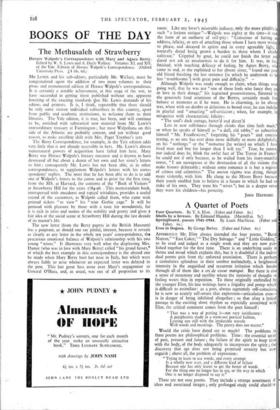BOOKS OF THE DAY
The Methusaleh of Strawberry
Horace Walpole's Correspondence with Mary and Agnes Berry. Edited by W. S. Lewis and A. Dayle Wallace. Volumes Xl. and XII. of the Yale Edition of Horace Walpole's Correspondence. (Oxford University Press. £4 14s. 6d.) MR LEWIS and his sub-editors, particularly Mr. Wallace, must be congratulated upon the addition of two more volumes to their pious and monumental edition bf Horace Walpole's correspondence. It is certainly a notable achievement, at this stage of the war, to have succeeded in getting them published without any, apparent lowering of the exacting standards tat Mr. Lewis demands of his editors and printers. It is, I think, regrettable that there should be only some sixteen individual subscribers in this country, apart from public and academic institutions, to welcome them to their libraries. The Yale edition, it is true, has been, and will continue to be, enriched with substantial new material from Mr: Lewis's extraordinary treasury at Farmington ; but most Walpolians on this side of the Atlantic are probably content, and not without good reason, to make excellent shift with Mrs. Paget Toynbee's text.
The Berry Correspondence, for example, in the Yale edition adds very little that is not already -accessible in hers. Mr. Lewis's almost supernatural powers of acquisition have failed him here. Mary Berry was Horace Walpole's literary executor and is known to have destroyed all but about a dozen of her own and her sister's letters to him ; consequently Mr. Lewis has not been able, as in other correspondences, to supplement Walpole's letters with his corre- spondents' replies. The most that he has been able to do is to add one of Walpole's letters to the canon and to print for the first time, from the MS. at Harvard, the contents of the "Book of Visitors" at Strawberry Hill for the years 1'784-96.. This memorandum book, interspersed with anecdotes and topical trivialities, provides a useful record of the customers, as Walpole called them, who came with printed tickets " to view " his " trim Gothic cage." It will be perused with pleasure by those with a taste for mondanites, for it is rich in titles and names of the nobility and gentry and gives a fair idea of the social scene at Strawberry Hill during the last decade of its master's life.
The new letter (from the Berry papers in the British Museum) has a poignant, or should one say pitiful, interest, because it reveals as clearly as any letter in the whole ten years' correspondence, the precarious emotional balance of Walpole's relationship with his two young " wives." It illustrates very well what the displeasing Mrs. Darner (who was in love with Mary Berry) called " his grand fusses," of which the best example in this correspondence is the absurd one he made when Mary Berry hurt her nose in Italy, but which were always liable to arise whenever an expected letter was delayed in the post. This last great fuss arose over Mary's engagement to General O'Hara, and, as usual, was out of all proportion to its cause. Like any lover's miserable jealousy, only the more pitiable
such " a forlorn antique "—Walpole was eighty at the t the form of an outburst of self-pity: " Conscious of having address, felicity, or arts of attaching those whom I have most wish to please, and decayed in spirits and in every agreeable light, naturally dread being grown a burden to those whom I chief! cultivate." Crippled by gout, he could not finish the letter a dared not ask an amanuensis to do it for him. It was, in fa finished, with touching delicacy of feeling, by Agnes Berry, w came in and, as she explained to her absent sister, " found our- old friend finishing the last sentence [in which he undertook to less ' troublesome '] with great pain and difficulty." -- Although Walpole was ready enough to claim, when things wer going well, that he was not "one of those fools who fancy they ar in love in their dotage," his ingrained possessiveness, flattered b the genuinely fond attentions of the Berrys, certainly made If behave at moments as if he were. He is charming, as he alway was, when with no doubts or delusions to brood over, he can indulg in playful and " amuzling " self-criticism ; when, for example, h misquotes with characteristic felicity:
" The soul's dark cottage, batter'd and decay'd
Lets in new selfishness through chinks that time hath made, or when he speaks of himself as " a dull, old tabby," or subscrib himself " Mr. Fondlewives," forgetting his " pouts " and conce trating, as no one has ever done more skilfully or more delightfully, on his "nothings " or the "nonsense [he writes] on which I hay lived man and boy for longer than I will say." True, he cannot, nor indeed does he, blink the awful fact of The Terror in France he could not if only because, as he wailed from his ivory-mantled tower, " I am outrageous at the destruction of all the visions that make history delectable ; without some romance it is but a register of crimes and calamities." The ancien regime was dying, though more violently, with him. He clung to the Misses Berry because their youth enabled him to believe in a future in which he had no stake of his own. They were his " wives "; but in a. deeper sense they were his children—his posterity.
JOHN HAYWARD.


























 Previous page
Previous page